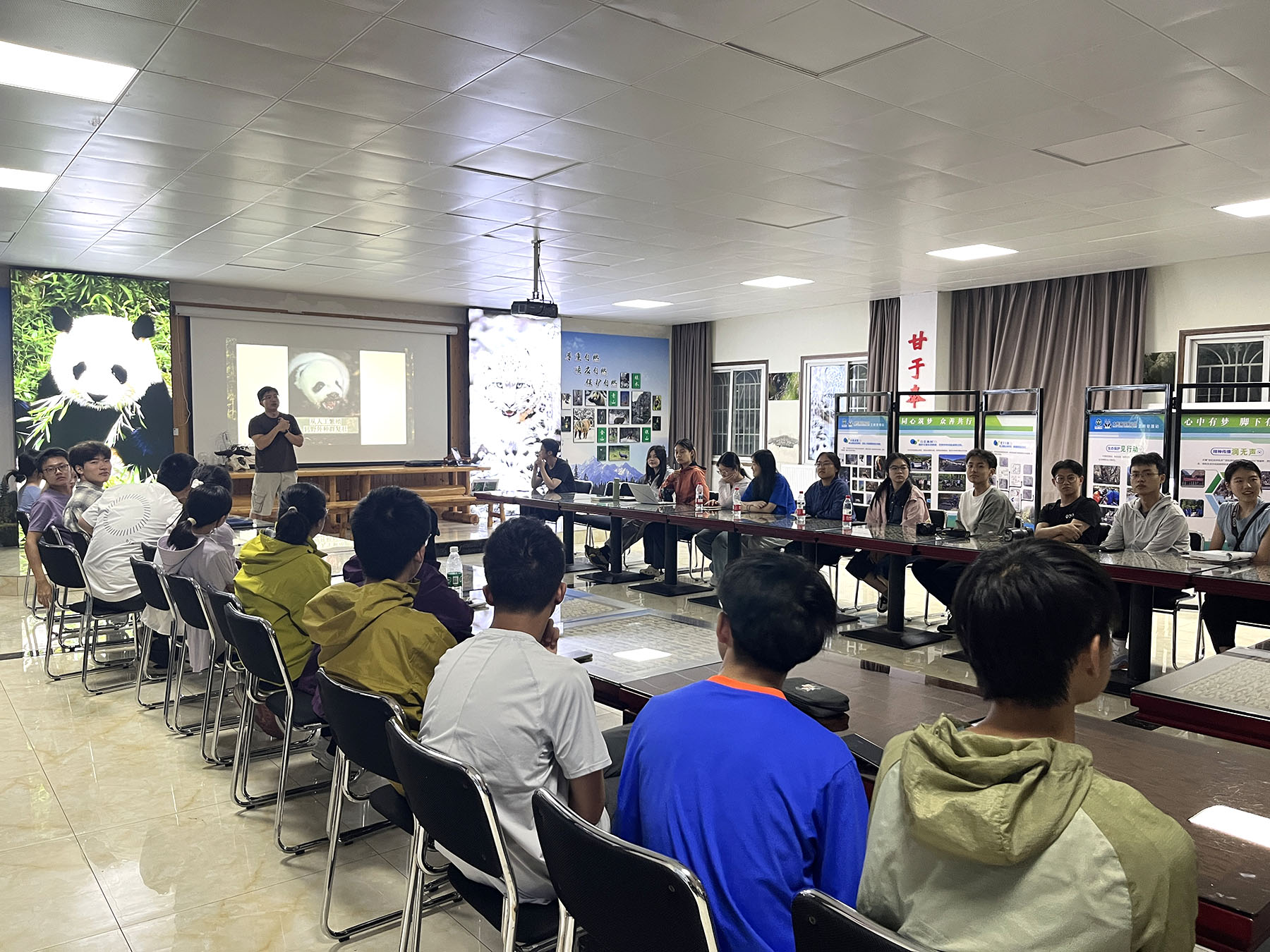Rangers at Sichuan's Wanglang reserve provide nature education tours in summer heat

Editor's note: As protection of the planet's flora, fauna and resources becomes increasingly important, China Daily is publishing a series of stories to illustrate the country's commitment to safeguarding the natural world.
For the over 20 rangers that patrol the Wanglang National Nature Reserve in Southwest China's Sichuan province, apart from patrolling and protecting the forest, they serve another critical function — education.
Located in the northern tip of Sichuan, Wanglang is less well known than the nearby scenic areas of Jiuzhaigou and Huanglong. But unlike those areas of spectacular natural beauty, Wanglang offers something different.
Particularly in the summer months, the reserve's rangers have a busy schedule acting as guides and educators to many tour groups, especially students on their summer breaks, teaching them about the forest, environmental protection, the local plant and animal species, and forest management.
READ MORE: Conservation efforts help revitalize Yangtze
This service sets Wanglang apart from other nature reserves, enabling it to carve out its own niche in nature education.
The 323-square-kilometer park, about the size of the island of Malta, is visited by a diverse range of people, from elementary and high school students to scholars from some of the nation's top universities, as well as families and botany enthusiasts from overseas.
Popular pioneer
"Please don't ask me if there are any rooms available. There are absolutely none, even the rooms in nearby villages are fully booked," said Zhao Lianjun, director of the Wanglang reserve, in a recent WeChat post.
The bigger-than-usual summer travel surge in Wanglang can be attributed in part to people seeking respite from the scorching heat wave sweeping through the Sichuan basin, said Zhao.
Nestled in the Minshan Mountains, the reserve is renowned for its cooler climate in the summer months, owing to its elevation ranging from over 2,000 to nearly 5,000 meters.
Despite the growing number of visitors and the income that brings, Zhao said that conservation will always remain the key focus of the reserve.
This summer, Wanglang struggled to accommodate visitors at peak times.
The Wanglang Giant Panda Camp, the sole lodgings available for tourists, can only cater to a little over 100 people. "These rooms are typically pre-booked by nature education tour groups," Zhao said.
The reserve's dormitories can accommodate 70 to 80 further people, but they are exclusively reserved for visitors from collaborating institutions. "They're primarily utilized by college students and their teachers on field internship expeditions," he said. "Also, we expect to channel most of our visitors to homestays in villages near the reserve, bringing a solid income to the local communities."
According to the reserve manager, Wanglang was one of the very first nature reserves in the country to offer nature education. Wanglang was established as a wild giant panda reserve in 1965, along with the reserves of Wolong, Baihe and Labahe.
While Wanglang may not boast the same natural spectacle as Jiuzhaigou or Huanglong, both World Heritage Sites, its long tradition of cooperating with research institutions, rich biodiversity and diverse habitats have made it a prime location for nature education.
Zhao said that the reserve has run nature education programs for more than 10 years.
"The earliest visitors to Wanglang were researchers and their students from universities and scientific institutions," he said. "They discovered an ideal research environment in Wanglang, and many have since become regular visitors."
The reserve was also among the first in China to engage in international cooperation, including scientific research initiatives with renowned conservation biologists such as George Schaller and John MacKinnon.
College students make up the vast bulk of those coming to Wanglang for nature education, Zhao said.
Over the years, the reserve has forged partnerships with more than 20 universities and institutions, including some of the nation's leading academic institutions such as Peking University in Beijing and Fudan University in Shanghai.
More than 60 undergraduate students and 30 doctoral candidates have successfully completed their research projects based on fieldwork conducted in Wanglang, Zhao said.
In June, nearly 80 students and teachers from Peking University completed their regular summer field study at the reserve, and last month, over 20 students and teachers from Fudan University stayed there for a five-day study tour, he said.
"A dozen high school students from Shanghai also joined the tour," Zhao said. "In the summer, most of the participants of our various nature education programs are students."

Versatile rangers
With its pristine forests, shrubs, meadows and alpine wetlands, Wanglang is home to a diverse array of wildlife, including 14 first-class protected species such as giant pandas, golden monkeys, takins and snow leopards, as well as 15 second-class protected species such as wolves, red foxes and golden cats. The park also boasts over 270 bird species and about 60 species of orchids.
Another of Wanglang's key strengths in nature education lies in its team of seasoned rangers.
The rangers often collaborate with scholars as field guides or research assistants. Over time, through learning with experts, many rangers have developed specialized knowledge in fields such as botany, amphibians, reptiles and mammals, enabling them to serve as effective nature education instructors.
"Any tour group venturing into the wilderness of Wanglang is required to engage at least one ranger as their guide or instructor," Zhao said. "Our ranger services are priced at about 200 yuan ($28) per hour, ensuring visitors receive expert guidance during their exploration."
The guide services not only enhance the visitor experience but also offer a source of additional income for the rangers.
"For many of our rangers, the income from guiding tours supplements their monthly wages, which can be as humble as 3,000 yuan," Zhao said. "This extra income serves as a well-deserved reward for their unwavering commitment to nature conservation."
According to the manager, an experienced ranger can get five or six opportunities to guide tour groups over summer.
The park also boasts one of the best natural education interpretation systems, such as information signs and experience facilities, found in any nature reserve in China.
More than 2 million yuan was spent over two years in developing the system, designed by a team from Fudan University, Zhao said.
A total of 16 routes categorized into observational, recreational and educational were designed to cater to different visitor needs, featuring hundreds of interpretive panels scattered along the routes, according to Yong Yi, a teacher at Fudan University who led the design team.
These routes guide visitors through the park, offering a deeper and more authentic natural experience within a controlled time frame.
"Each route, with a length ranging from 600 meters to 1,500 meters, can give a visitor an immersive experience for 30 to 45 minutes," Yong said. "While going with a ranger, a trip can be controlled to under 90 minutes."
The interpretive content is presented in a clear and engaging manner to make complex scientific knowledge easily understandable for the public. By utilizing illustrations and interactive elements, visitors can grasp the geological processes that shaped the park's landscapes.
Zhao said that the interpretive system has ensured that every visitor can have the opportunity to receive nature education at the national park.
"National parks should be accessible to all and serve as vital spaces for learning about and practicing nature conservation," Zhao said. "Through our interpretive system, we expect to inspire a love and respect for nature, encouraging visitors to actively participate in conservation efforts. So we treat every visitor to Wanglang as a participant in nature education."
Last year, the reserve received more than 80,000 visitors, of which about 10,000 could be considered as more serious ecotourists, Zhao said.
Family exploration
Zan Qing, a 39-year-old bank employee in Shanghai, embarked on a unique family adventure with her husband and two sons during their summer vacation this year. Her husband, an avid bird-watcher for five years, sought a destination where he could indulge in his passion for bird-watching while providing his family with a memorable travel experience.
After thorough research, they decided on Wanglang as the perfect destination. Zan booked a family room at the Wanglang Giant Panda Camp a month in advance. Last month, the family embarked on a three-day, two-night tour in the reserve.
In addition to exploring the usual tourist routes, the family invested in a half-day nature education tour led by a knowledgeable reserve ranger, spending 500 yuan for the experience.
On the morning of July 22, they were introduced to their guide, Liang Changping, a seasoned ranger with almost three decades of experience working in Wanglang.
ALSO READ: Protecting nature through photography
Liang led the family through a route in the reserve's coniferous forest alongside a stream, showcasing various orchid species, including the rare Cypripedium palangshanense under second-class State protection, and evidence of the presence of giant pandas.
"When we were in the forest, we felt we might encounter wild giant pandas at any moment," Zan said. "While we didn't see the pandas themselves, witnessing their habitat and traces of their existence, like their fresh feces, was surreal. My sons were truly captivated by the experience."
After the forest hike, Liang managed to find three stream salamanders, Batrachuperus pinchonii, at a river running through the reserve. The children were so fascinated by the discovery of the amphibians unique to the region that they spent one hour admiring the animals.
Although they missed spotting blue sheep and blue-eared pheasants, Zan said that the family cherished every moment spent in Wanglang.
After the tour, ranger Liang returned to the rangers' living quarters at around 2 pm and ate a cold lunch in the canteen.
"We are used to providing longer tours like this," he said. "While our guests truly enjoy our guiding, believe me, we actually love our work more."
Contact the writer at chenliang@chinadaily.com.cn


